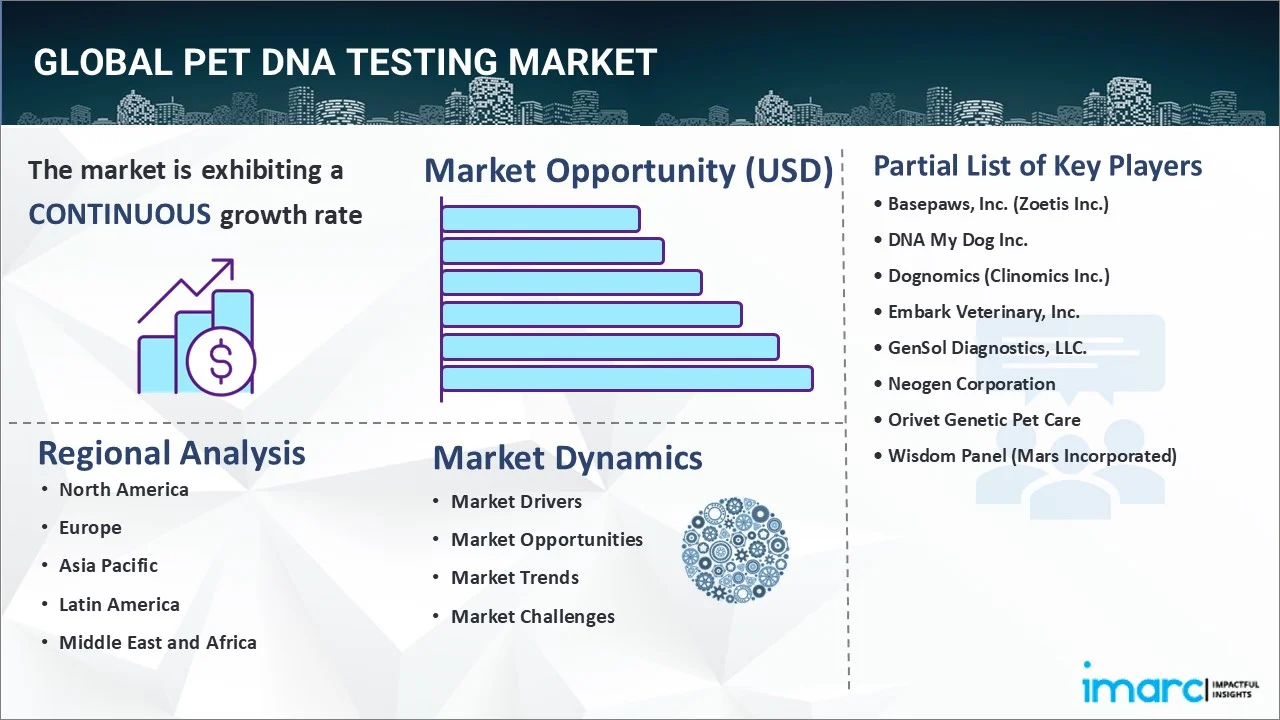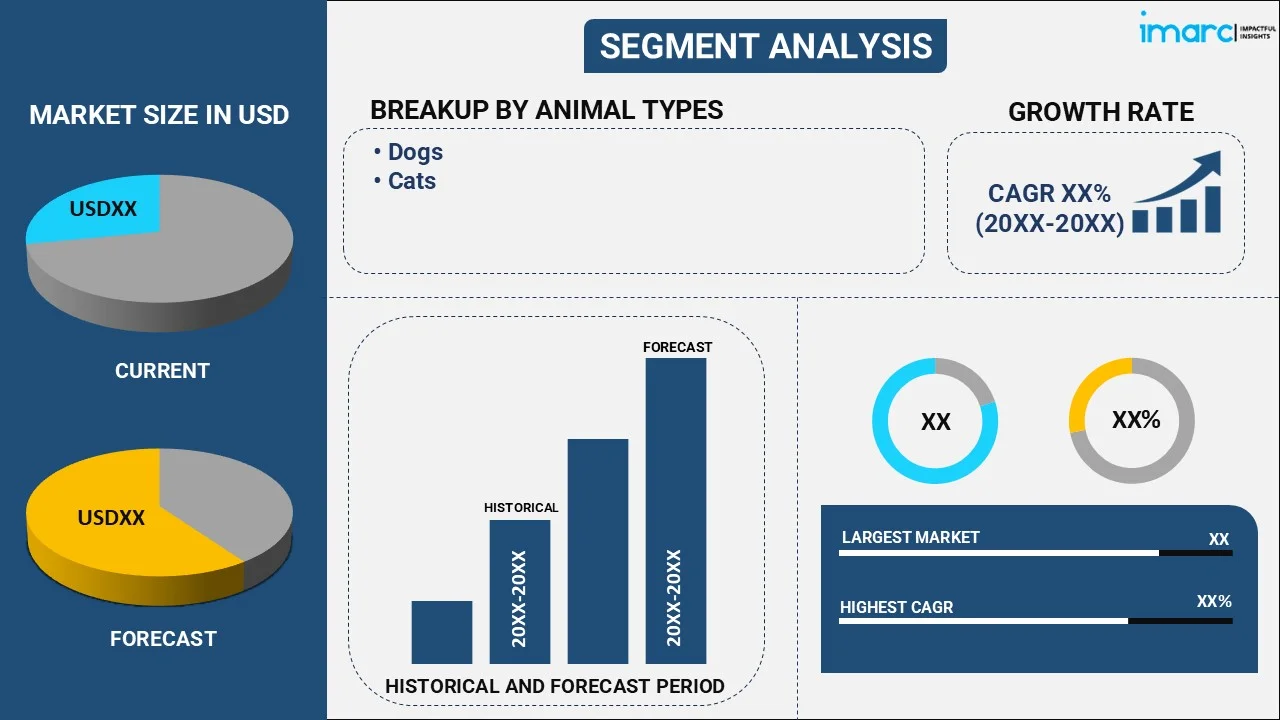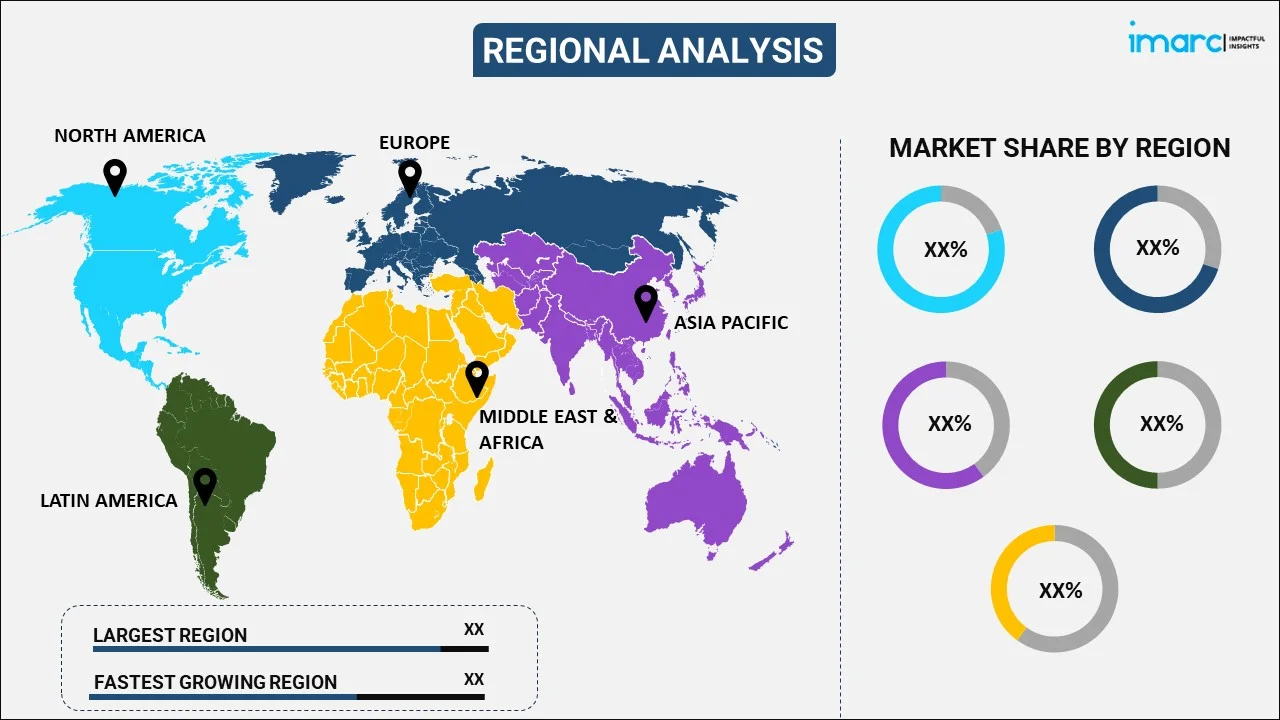
Pet DNA Testing Market Report by Animal Type (Dogs, Cats), Sample Type (Blood, Saliva, Semen, and Others), Test Type (Breed Profile, Genetic Diseases, Health and Wellness), End User (Pet Owners, Breeders, Veterinarians), and Region 2025-2033
Pet DNA Testing Market Size, Share And Trends
The global pet DNA testing market size reached USD 391.0 Million in 2024. Looking forward, IMARC Group expects the market to reach USD 806.5 Million by 2033, exhibiting a growth rate (CAGR) of 7.54% during 2025-2033. Growing awareness among pet owners regarding the benefits of DNA testing, the rising interest in personalized pet healthcare, the expanding pet population with diverse genetic backgrounds, and collaborative efforts between veterinary professionals and geneticists are few of the factors contributing to the market growth.
|
Report Attribute
|
Key Statistics |
|---|---|
|
Base Year
|
2024 |
|
Forecast Years
|
2025-2033
|
|
Historical Years
|
2019-2024
|
| Market Size in 2024 | USD 391.0 Million |
| Market Forecast in 2033 | USD 806.5 Million |
| Market Growth Rate (2025-2033) | 7.54% |
Pet DNA testing is a scientific process that involves analyzing the genetic material of animals to uncover insights about their ancestry, breed composition, and potential health predispositions. It operates by extracting a small sample of the pet's DNA, often collected through a saliva swab or blood sample. The DNA is then sequenced and compared to a comprehensive database of genetic markers to determine the pet's breed composition and potential genetic health markers. The advantages of pet DNA testing include gaining a deeper understanding of a pet's heritage and unique traits, aiding in early detection of potential health issues, and facilitating personalized care based on the pet's genetic makeup. There are two main types of pet DNA testing: breed identification, which reveals the mix of breeds in a pet's lineage, and health screening, which provides insights into genetic health risks and predispositions, enabling proactive veterinary care.

The global pet DNA testing market is influenced by the growing awareness among pet owners about the potential benefits of DNA testing. This is further boosted by the increasing interest in personalized healthcare for pets, as DNA testing enables tailored treatment plans based on genetic predispositions. Additionally, the expanding pet population, with a rising number of crossbreeds and purebreds, propels the need for genetic testing to understand lineage, traits, and potential health risks, which, in turn, is fueling the market growth. Furthermore, the surging research and development (R&D) activities aimed at uncovering new genetic insights amplifies market momentum significantly. Moreover, the collaborative efforts between veterinary professionals and geneticists foster advancements in the field, thereby boosting the market growth.
Pet DNA Testing Market Trends/Drivers:
Growing awareness and benefits of pet DNA testing
The pet DNA testing market is experiencing robust growth due to the increasing awareness among pet owners about the potential benefits of DNA testing for their furry companions. As pet owners become more informed about how genetic testing can provide valuable insights into their pets' health, traits, and potential risks, the demand for such services surges. This awareness stems from the dissemination of information through various channels, including veterinary clinics, online platforms, and pet-related media. As a result, pet owners are recognizing the advantages of personalized healthcare plans based on their pets' genetic profiles. This heightened understanding not only elevates the well-being of individual pets but also contributes to the overall growth of the market, establishing pet DNA testing as a sought-after solution in the realm of pet care.
Rising interest in personalized pet healthcare
The pet DNA testing market is being driven by an increasing interest in tailoring healthcare regimens for pets based on their genetic makeup. Pet owners are recognizing the potential of DNA testing to unveil vital information about their animals' susceptibility to certain diseases, allergies, and other health concerns. This personalized approach enables veterinarians to design more precise and effective treatment plans, resulting in improved health outcomes for pets. As the importance of preventive care gains traction, pet owners are keen on proactively identifying genetic markers that could impact their pets' well-being. This trend is shaping the market's growth as more individuals seek genetic insights to empower their decision-making and contribute to the long-term health of their cherished companions.
Expanding pet population and genetic diversity
The burgeoning population of pets, characterized by a growing variety of crossbreeds and purebreds, is a pivotal driver propelling the pet DNA testing market. With the introduction of new breeds and hybrid combinations, pet owners are increasingly curious about their animals' lineage, traits, and genetic heritage. As more individuals seek to understand the genetic composition of their pets, the demand for testing services escalates. This factor is particularly relevant in a global context where pet ownership is on the rise, leading to a larger customer base for DNA testing providers. The market capitalizes on this trend by offering comprehensive genetic profiling services that cater to the diverse and expanding pet population.
Pet DNA Testing Industry Segmentation:
IMARC Group provides an analysis of the key trends in each segment of the global pet DNA testing market report, along with forecasts at the global, regional, and country levels from 2025-2033. Our report has categorized the market based on animal type, sample type, test type, and end user.
Breakup by Animal Type:

- Dogs
- Cats
Dogs dominate the market
The report has provided a detailed breakup and analysis of the market based on the animal type. This includes dogs and cats. According to the report, dogs represented the largest segment.
The dogs segment is driven by the diverse breeds and sizes encompassed within this category, which have ignited a surge in demand for genetic testing. Pet owners are increasingly curious about their dogs' lineage, breed-specific traits, and potential health risks, fueling the need for DNA testing services. Moreover, the rising trend of adopting rescue dogs further amplifies the demand for genetic insights to understand potential health issues and behaviors. Conversely, the market for cat DNA testing is buoyed by the enigmatic nature of feline genetics. Cats' varied coat patterns, colorations, and temperaments drive curiosity among owners, compelling them to seek genetic elucidation. Furthermore, as cats are prone to specific hereditary health concerns, genetic testing provides crucial information for informed healthcare decisions. These factors, tailored to the unique characteristics of dogs and cats, collectively propel the growth of their respective DNA testing segments.
Breakup by Sample Type:
- Blood
- Saliva
- Semen
- Others
Saliva dominates the market
The report has provided a detailed breakup and analysis of the market based on the sample type. This includes blood, saliva, semen, and others. According to the report, saliva represented the largest segment.
The preference for blood samples stems from their accuracy and reliability in revealing comprehensive genetic insights. Blood-based testing offers a direct analysis of a pet's genetic makeup, aiding in the identification of potential health risks and hereditary traits. Similarly, saliva-based testing gains traction due to its non-invasive nature, appealing to pet owners who seek a stress-free experience for their animals. The ease of sample collection fosters higher participation rates, thereby contributing to the market's expansion. Semen samples, although relatively niche, serve a critical role in breeding programs. DNA analysis of semen helps optimize breeding outcomes by ensuring genetic diversity and minimizing hereditary issues. The growth of "others segment, which encompass various biological materials, can be attributed to ongoing research and innovation. As the field advances, newer sample sources are being explored to enhance the accuracy and scope of genetic testing.
Breakup by Test Type:
- Breed Profile
- Genetic Diseases
- Health and Wellness
Genetic diseases dominate the market
The report has provided a detailed breakup and analysis of the market based on the test type. This includes breed profile, genetic diseases, and health and wellness. According to the report, genetic diseases represented the largest segment.
The growth of the market by test type is primarily driven by the increasing adoption of comprehensive genetic testing panels that offer a comprehensive understanding of a pet's genetic makeup, including traits, ancestry, and potential health risks. As pet owners seek a more comprehensive view of their pets' genetic information, the demand for such multifaceted testing solutions rises. The breed profile segment's expansion is fueled by the rising fascination with understanding the lineage and unique characteristics of both purebred and mixed-breed pets. This curiosity drives owners to opt for DNA testing to uncover the genetic origins and traits of their beloved animals. Genetic diseases serve as a critical growth driver as well, with pet owners increasingly recognizing the significance of early disease detection through genetic screening. As awareness grows about the potential to identify hereditary health issues and susceptibility to certain diseases, the demand for genetic testing to preemptively manage and mitigate health risks escalates. In the health and wellness segment, the trend toward personalized care extends to pets, fostering demand for DNA testing to inform tailored dietary and lifestyle recommendations.
Breakup by End User:
- Pet Owners
- Breeders
- Veterinarians
Breeders dominate the market
The report has provided a detailed breakup and analysis of the market based on the end user. This includes pet owners, breeders, and veterinarians. According to the report, breeders represented the largest segment.
For pet owners, the increasing awareness of the benefits of DNA testing serves as a primary driver. They are eager to gain insights into their pets' health predispositions, traits, and potential risks, enabling more informed decision-making for their animals' well-being. Breeders, on the other hand, are drawn by the potential to enhance breeding practices through genetic testing. DNA analysis enables them to make informed breeding choices that minimize health risks and undesirable traits, ultimately contributing to the production of healthier and genetically diverse litters. This resonates with the growing demand for responsible and ethical breeding practices. Veterinarians find value in DNA testing as it empowers them to formulate targeted healthcare plans based on individual pets' genetic profiles, enhancing treatment efficacy and overall patient care.
Breakup by Region:

- North America
- United States
- Canada
- Europe
- Germany
- France
- United Kingdom
- Italy
- Spain
- Others
- Asia Pacific
- China
- Japan
- India
- South Korea
- Australia
- Indonesia
- Others
- Latin America
- Brazil
- Mexico
- Others
- Middle East and Africa
North America exhibits a clear dominance, accounting for the largest pet DNA testing market share
The report has also provided a comprehensive analysis of all the major regional markets, which include North America (the United States and Canada); Europe (Germany, France, the United Kingdom, Italy, Spain, and others); Asia Pacific (China, Japan, India, South Korea, Australia, Indonesia, and others); Latin America (Brazil, Mexico, and others); and the Middle East and Africa. According to the report, North America accounted for the largest market share.
In North America, the key factors driving the pet DNA testing market encompass a combination of factors, including heightened pet ownership rates, a growing emphasis on pet health and wellness, and an advanced healthcare infrastructure that supports genetic testing. In Europe, a similar trend emerges as the region experiences a surge in pet DNA testing demand due to an increasingly health-conscious pet owner population, coupled with a well-established network of veterinary clinics and research institutions. In the Asia Pacific, the market is being propelled by the region's rising middle-class population, urbanization, and the adoption of pets as family members, which stimulates interest in advanced pet care services such as genetic testing. Latin America, with its expanding pet industry and increasing disposable income, is witnessing a gradual uptake of pet DNA testing as owners seek comprehensive insights into their pets' health. In the Middle East and Africa, the market's growth is influenced by a blend of factors, including the emergence of pet humanization trends, a growing awareness of pet health, and a gradual shift towards sophisticated pet care practices.
Competitive Landscape:
The competitive landscape within the pet DNA testing market is characterized by dynamic interactions among various entities vying for prominence. As the demand for pet DNA testing surges, companies are strategically positioning themselves to offer comprehensive and innovative solutions. Key market players are engaged in research and development endeavors to enhance testing accuracy, expand the range of traits covered, and develop user-friendly testing kits. Partnerships with veterinary clinics and animal health organizations bolster credibility, while marketing efforts focus on educating pet owners about the benefits of genetic testing. Pricing strategies vary, with some emphasizing affordability to capture a wider consumer base, while others target premium segments with specialized offerings. Customer support, ease of access, and data privacy also feature prominently in competitive strategies. As the market evolves, an emphasis on building brand reputation, establishing thought leadership, and cultivating a robust online presence remains crucial for sustaining competitiveness. The market's growth potential attracts new entrants, intensifying competition. In this dynamic landscape, differentiation through technological advancements, customer-centric approaches, and ethical practices forms the cornerstone of companies aiming to thrive and establish themselves as leaders in the burgeoning pet DNA testing domain.
The report has provided a comprehensive analysis of the competitive landscape in the market. Detailed profiles of all major companies have also been provided. Some of the key players in the market include:
- Basepaws, Inc. (Zoetis Inc.)
- DNA My Dog Inc.
- Dognomics (Clinomics Inc.)
- Embark Veterinary, Inc.
- GenSol Diagnostics, LLC.
- Neogen Corporation
- Orivet Genetic Pet Care
- Wisdom Panel (Mars Incorporated)
Pet DNA Testing Market Report Scope:
| Report Features | Details |
|---|---|
| Base Year of the Analysis | 2024 |
| Historical Period | 2019-2024 |
| Forecast Period | 2025-2033 |
| Units | Million USD |
| Scope of the Report | Exploration of Historical and Forecast Trends, Industry Catalysts and Challenges, Segment-Wise Historical and Predictive Market Assessment:
|
| Animal Types Covered | Dogs, Cats |
| Sample Types Covered | Blood, Saliva, Semen, Others |
| Test Types Covered | Breed Profile, Genetic Diseases, Health and Wellness |
| End Users Covered | Pet Owners, Breeders, Veterinarians |
| Regions Covered | Asia Pacific, Europe, North America, Latin America, Middle East and Africa |
| Countries Covered | United States, Canada, Germany, France, United Kingdom, Italy, Spain, China, Japan, India, South Korea, Australia, Indonesia, Brazil, Mexico |
| Companies Covered | Basepaws, Inc. (Zoetis Inc.), DNA My Dog Inc., Dognomics (Clinomics Inc.), Embark Veterinary, Inc., GenSol Diagnostics, LLC., Neogen Corporation, Orivet Genetic Pet Care, Wisdom Panel (Mars Incorporated), etc. |
| Customization Scope | 10% Free Customization |
| Post-Sale Analyst Support | 10-12 Weeks |
| Delivery Format | PDF and Excel through Email (We can also provide the editable version of the report in PPT/Word format on special request) |
Key Questions Answered in This Report:
- How has the global pet DNA testing market performed so far, and how will it perform in the coming years?
- What are the drivers, restraints, and opportunities in the global pet DNA testing market?
- What is the impact of each driver, restraint, and opportunity on the global pet DNA testing market?
- What are the key regional markets?
- Which countries represent the most attractive pet DNA testing market?
- What is the breakup of the market based on the animal type?
- Which is the most attractive animal type in the pet DNA testing market?
- What is the breakup of the market based on the sample type?
- Which is the most attractive sample type in the pet DNA testing market?
- What is the breakup of the market based on the test type?
- Which is the most attractive test type in the pet DNA testing market?
- What is the breakup of the market based on the end user?
- Which is the most attractive end user in the pet DNA testing market?
- What is the competitive structure of the global pet DNA testing market?
- Who are the key players/companies in the global pet DNA testing market?
Key Benefits for Stakeholders:
- IMARC’s report offers a comprehensive quantitative analysis of various market segments, historical and current market trends, market forecasts, and dynamics of the pet DNA testing market from 2019-2033.
- The research study provides the latest information on the market drivers, challenges, and opportunities in the global pet DNA testing market.
- The study maps the leading, as well as the fastest-growing, regional markets. It further enables stakeholders to identify the key country-level markets within each region.
- Porter's five forces analysis assist stakeholders in assessing the impact of new entrants, competitive rivalry, supplier power, buyer power, and the threat of substitution. It helps stakeholders to analyze the level of competition within the pet DNA testing industry and its attractiveness.
- Competitive landscape allows stakeholders to understand their competitive environment and provides an insight into the current positions of key players in the market.
Need more help?
- Speak to our experienced analysts for insights on the current market scenarios.
- Include additional segments and countries to customize the report as per your requirement.
- Gain an unparalleled competitive advantage in your domain by understanding how to utilize the report and positively impacting your operations and revenue.
- For further assistance, please connect with our analysts.
 Request Customization
Request Customization
 Speak to an Analyst
Speak to an Analyst
 Request Brochure
Request Brochure
 Inquire Before Buying
Inquire Before Buying




.webp)




.webp)












